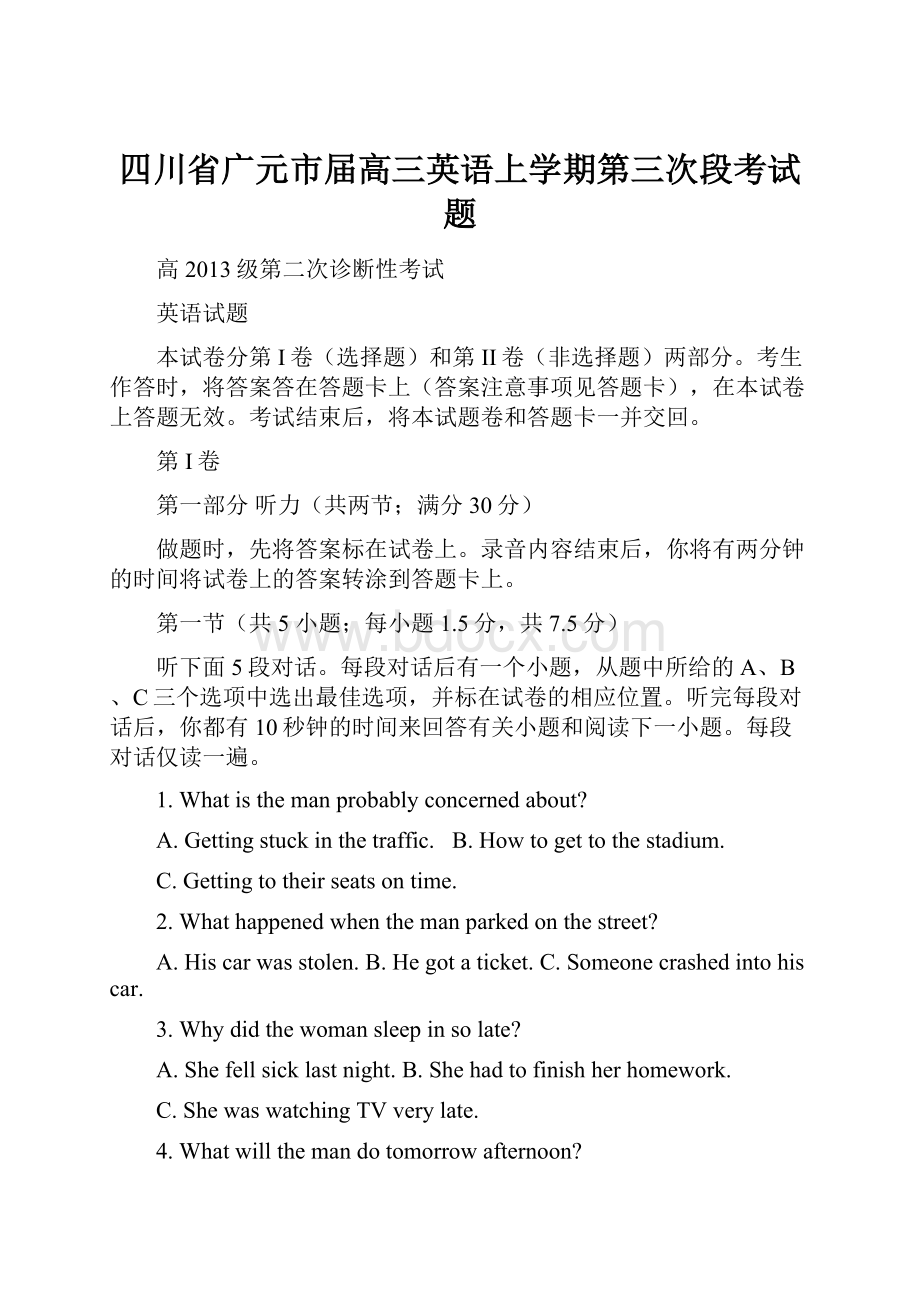四川省广元市届高三英语上学期第三次段考试题文档格式.docx
《四川省广元市届高三英语上学期第三次段考试题文档格式.docx》由会员分享,可在线阅读,更多相关《四川省广元市届高三英语上学期第三次段考试题文档格式.docx(16页珍藏版)》请在冰豆网上搜索。

每段对话仅读一遍。
1.Whatisthemanprobablyconcernedabout?
A.Gettingstuckinthetraffic.B.Howtogettothestadium.
C.Gettingtotheirseatsontime.
2.Whathappenedwhenthemanparkedonthestreet?
A.Hiscarwasstolen.B.Hegotaticket.C.Someonecrashedintohiscar.
3.Whydidthewomansleepinsolate?
A.Shefellsicklastnight.B.Shehadtofinishherhomework.
C.ShewaswatchingTVverylate.
4.Whatwillthemandotomorrowafternoon?
A.Playabasketballgame.B.Watchabasketballgame.C.Gotothedentist.
5.WhatwillthemandoonSaturday?
A.Stayathome.B.GosomewherewithMary.C.Takethewoman’splaceatwork.
第二节
听下面5段对话或独白。
每段对话或独白后有几个小题,从题中所给的A、B、C三个选项中选出最佳选项,并标在试卷的相应位置。
听每段对话或独白前,你将有时间阅读各个小题,每小题5秒钟;
听完后,各小题将给出5秒钟的作答时间。
每段对话或独白读两遍。
听第6段材料,回答第6、7题。
6.Whatdoesthemanthinkofthegirl’squestion?
A.Itisn’timportant.B.Itneedn’ttobeanswered.C.It’sdifficulttoanswer.
7.Whatdoesthemansayabouttheoceanandthesky?
A.Theyarerelated.B.Theylookexactlythesame.
C.Theyhavenothingtodowitheachother.
听第7段材料,回答第8至10题。
8.Inhowmanydifferentwaysdidthemancontactthewoman?
A.Two.B.Three.C.Four.
9.Whathappenedfiveminutesago?
A.Thewomanturnedonherphone.B.Themanleftamessageforthewoman.
C.Thewomangotbackfromlunch.
10.Whatdoesthewomanimplyaboutherinterview?
A.Itwasthefirstone.B.Itwentprettywell.C.Shedidn’tgetthejob.
听第8段材料,回答第11至13题。
11.Howmanygrapeswereinthebunch?
A.20.B.30.C.50.
12.Accordingtothewoman,whydoJapanesepeoplelikeperfectfruit?
A.Theyliketoeatitforbreakfast.B.Theyturnitintodrinks.
C.Theyliketogiveitasagift.
13.Whatdoesthewomanthinkofthegrapes?
A.Itisnotwisetobuythem.B.Theyareworthbuying.
C.She’dgoonatriptoJapanforthem.
听第9段材料,回答第14至17题。
14.Wherewillthefilmbemade?
A.Inthespeakers’neighborhood.B.Inanotherpartofthecity.C.Inanearbycity.
15.Whatdoesthemanwanttodo?
A.Callthemoviedirector.B.Writealettertothemayor.C.Watchthemoviebeingmade.
16.Whathappenedlasttimeamoviewasmade?
A.Themanhadtomoveoutforawhile.B.Theman’sguestscouldn’tfindhotelrooms.
C.Themanhadtoreschedulehismeeting.
17.Howdoesthewomanfeelaboutthefilmshooting?
A.Itwillcostthecityalotofmoney.B.Itwilltakealongtimetomake.
C.Itwillbegoodforthelocaleconomy.
听第10段材料,回答第18至20题。
18.Whatisthistalkmainlyabout?
A.Thewaythepyramidswerebuilt.B.Thehistoryofthepyramids.
C.Waystoprotectthepyramids.
19.Howweretheworkerspaid?
A.Ingold.B.Withjewelsandfood.C.Withfood,clothes,andhousing.
20.Whydidguardsneedtolivenearthepyramids?
A.Topreventtouristsfromdamagingthem.B.Tomakesurethebuilderswerebusy.
C.Tostoppeoplefromstealingthingsinside.
第二部分阅读理解(共两节,满分40分)
第一节(共15小题;
每小题2分,满分30分)
阅读下列短文,从每题所给的四个选项(A、B、C和D)中,选出最佳选项,并答在答题卡上,将该项涂黑。
A
Inmyeyes,themostbasicandpowerfulwaytocommunicatewithanotherpersonistolisten.Justlisten.Perhapsthemostimportantthingweevergiveeachotherisourattention.Andespeciallyifit’sgivenfromtheheart.Whenpeoplearetalking,there’snoneedtodoanythingbutreceivethem.Listentowhatthey’resaying.Careaboutit.Mosttimescaringaboutitisevenmoreimportantthanunderstandingit.Mostofusdon’tvalueourselvesorourloveenoughtoknowthis.It
hastakenmealongtimetobelieveinthepowerofsimple
saying“I’msosorry,”whensomeoneisinpain.
Oneofmypatientstoldmethatwhenshetriedtotellher
storypeopleofteninterruptedtotellherthattheyoncehad
somethingjustlikethathappeningtothem.Herpainbecame
astoryaboutthemselves.Eventuallyshestoppedtalkingtomostpeople.Weconnectthroughlistening.Whenweinterruptwhatsomeoneissayingtoletthemknowthatweunderstand,wemovethefocusofattentiontoourselves.Whenwelisten,theyknowwecare.
Ihaveevenlearnedtorespondtosomeonecryingbyjustlistening.IntheolddaysIusedtoreachforthehandkerchiefs,untilIrealizedthatpassingapersonahandkerchief
maybejustanotherwaytoshuthimdown,totakethemoutoftheirexperienceofsadness.NowIjustlisten.Whentheyhavecriedalltheyneedtocry,theyfindmetherewiththem.
Thissimplethinghasnotbeenthateasytolearn.ItcertainlywentagainsteverythingIhadbeentaughtsinceIwasveryyoung.Ithoughtpeoplelistenedonlybecausetheywere
tooshytospeakordidnotknowtheanswer.ButnowIknow
thatalovingsilenceoftenhasfarmorepowertohealthanthekindestwords.
21.Whatdoestheauthorvaluemostinthecommunicationwitheachother?
A.Deepunderstanding.
B.Attentionfromheart.
C.Saying“I’msorry”
D.Doingnothing.
22.Thewomanpatientstoppedtellingherstorytomostpeoplebecause________.
A.shedidn’tgetenoughrespectfromothers
B.peopleoftentoldhertheirownopinions
C.peoplecouldn’tunderstandhersadsituation
D.shewasdiscouragedbybeingofteninterrupted
23.Ifyouhandahandkerchieftosomeonecrying,youmay________.
A.stophimfromlettingouthissorrowB.makehimembarrassed
C.encouragehimtocontinuetocry
D.hurthisfeelings
24.Whichofthefollowingmightbetheauthor’sopinionaboutcommunication?
A.
Justlisten.
B.Keepsilent.C.Becareful.
D.Tellyourownstory.
B
Iusedtohaveafriendthatwasdiagnosedwithterminalcancer,andthenewsthathemightonlyliveuptosixmonthswasagreatshocktohim,hisfamily,andhisfriends.However,inspiteoftheseriousillness,hewasinitiallydeterminedtolookintoallavailabletreatmentsthatmightcureorextendhislife.Ithinkthatwhenyoufindyourselfinsuchsituations,youtendtolookupeverypossiblewayforhopeofsavingyourlife.
Withmonthsgoingonandhishealthgrewworse,Inoticedanunexpectedchangeinattitudethatcameoverhim.Hehadalsobeenahappypersonwithacheerfulpersonality,butratherthangiveintodiscouragementandself-pity,hetookcomfortinGodandhumanity.Histalksfocusedonothersratherthanhimself,andhespokeoftheafterlifeassomethinghewaspreparedfor,believingthathisconcernedancestors,includinghismotherandfather,weretherewaitingforhim.
Inthelastfewmonths,weeks,anddaysofhislife,hewaskindlycaredforbyfamily,friends,hislovingwife,wholookedafterbothhisphysicalandemotionalneeds,andworkersfromalocalhospice
(安养院)
cametothehometoregulatehismedicationandprovideanyotherneededsupport.Hedidn'
tcomplainabouthisfate,andhewillinglyallowedotherstoservehim.Indeed,onemightthinkwhyGodallowsdeathandsufferinginourworld,butforme,suchexperiencestaughtmetovaluefamilymoreandkindnessforothers.Youoftencan'
tlearntheseimportantattributesinthelapofluxury,andperhaps,suchanexperienceisthegreatestandfinalgifttheillnesscangivethoseleftbehind.
25.Whichwordcanbestdescribetheman'
sinitialreactionassoonashewasdiagnosedwithcancer?
A.Astonished.
B.Annoyed
C.Terrified.
D.Confused.
26.Whatdidthemandoafterhefirstlearnedofhisillness?
A.Hewasoperatedonimmediately.B.Heresearchedcancertreatments.
C.Heretiredfromhisjob.D.Hefeltsad,doingnothing.
27.Whatwastheman'
smainsourceofcomfortafterseveralmonthswiththedisease?
A.Hisfamilyandfriends.
B.Thecarefromothers.
C.Hisdoctors’encouragement.
D.Hisbeliefinhumanity.
C
Wouldyouwantadoctorwhogothighmarksinmedicalschooljustfortryinghard?
Apparentlymanycollegestudentswouldhavenoproblemwiththat.Theybelievestudentsareowedagoodgradesimplybecausetheyputalotofeffortintoaclass.
Theresearchersaskedmorethan800undergraduatesiftheyagreedordisagreedwithsomestatements.Forexample:
"
IfIhavecompletedmostofthereadingforaclass,IdeserveaBinthatcourse."
And:
AprofessorshouldnotbeannoyedwithmeifIreceiveanimportantcallduringclass."
Just
16percentthoughtitwasOKtotakethatphonecall.But66percentagreedthataprofessorshouldconsidereffortandnotjustthequalityofastudent'
sworkwhendecidinggrades.And40percentthoughttheyshouldgetaB,thesecondhighestmark,justbecausetheydidmostofthereadingforclass.
Someexpertsarenotsurprisedthatstudentsoftenseenodifferencebetweeneffortandresults.Socialcriticsliketosaythatinchildren'
sactivitiesthesedayseveryonegetsanawardjustfortrying,sonoonewillfeelrejected.
Yetcompetitiontogetintothebestcollegesisfiercerthanever.Studentsmayworrythatlowgradeswillkeepthemoutofgraduateschooloragoodjob.
Andtheremaybeanotherexplanation:
pressurefromparentstogetagoodreturnonthefamily'
sinvestment.Thesedays,collegecancostmorethanahouse.
AformerteachingassistantrecentlywrotetotheNewYorkTimesabouthisexperiencewithgradeexpectations.Hewouldtrytoexplainitthiswaywhenstudentsaskedforatopgradejustforstudyinghardinchemistryclass:
Whatifabaseballplayercametospringtrainingandworkedharderthanalltheothers,butstillcouldnotplaywell?
Wouldtheteamaccepthimanyway,justbecausehetrieds